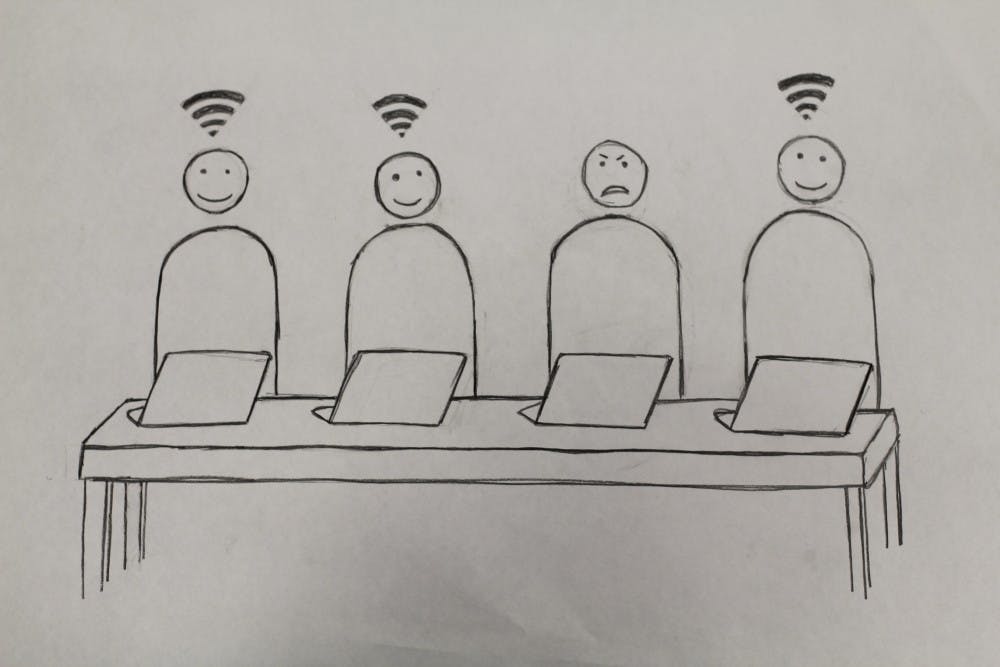Elon University’s WiFi network has enough bandwith to support the campus, and the only issue in making sure it runs well is communication.
The number of unique devices on Elon’s network is constantly growing, according to Christopher Waters, assistant vice president for Technology and Chief Information Officer. This is part of the larger trend that students are bringing their own devices to campus.
“The university has ample bandwith to provide all of what we need to our students and faculty,” Waters said. “Clearly, folks are watching more video than they’ve ever watched before. What we don’t know is YouTube, academic content, something on Moodle for your course, or is it Netflix. We don’t know, but we can see it happening.
“There are no worries about the bandwith itself provided to the campus.”
Bandwith, or the rate of data transfer, has increased on Elon’s campus in recent years. When students have issues with the WiFi, there are usually a few main culprits.
One of the most common is concentration of users. If a residence hall is practically full and everyone’s streaming video on a device, Waters said it’s possible for students to experience “a competition for who’s on and who’s getting which bandwith when.” This could slow down the connection for individual devices.
The same goes for what Waters referred to as a power issue or a flicker, affecting a wireless access point (WAP).
Two larger issues involve personal wireless networks and wireless printers.
If one user’s laptop or cellphone is configured in a way that it searches for the best signal, and another student or faculty member has a personal hotspot or wireless network set up, then it could cause the device to try to connect with that instead of Elon’s network.
Elon recently added a printer authentication system, but prior to that, configuration issues arose that would allow anyone to print to certain printers and clog up Elon’s network.
All of these issues, Waters said, can be alleviated by contacting Technology Services. If a student calls in with a WiFi issue, Waters said, it can typically be resolved quickly.
The problem is that Waters and his staff doesn’t get many reports of those incidents.
“I have a couple staff members who follow social media — we watch even Yik Yak,” he said. “When students say wireless is horrible, we look at our logs and we never had any outages or downtime or anything. But did you have a problem in one room in one space? Maybe. That’s what we’re trying to combat.
“Tell us often. Keep us informed. Most important is to tell us in the moment. We can do more if we can look at that data.”
Elon’s network is powered by Cisco, and the access points are being constantly updated, according to Waters. His staff is looking at access points’ locations in residence halls, particularly The Oaks Neighborhood, right now to help fix some issues students have with the network.
Additionally, Elon is continuing to reach out to local businesses to host network connections off campus. Currently, Elon offers connections at The Fat Frogg, The Root and Subway.
“I would say that this wireless conversation has been about refining what we already have,” Waters said. “People may already have a better experience between the fall and now because we’ve gone in and reinforced what we have. It’s so easy for students to become consumers like they are at home and say it’s just bad. The answer is it doesn’t have to be if we know.”
Elon just added a guest WiFi network, and launched the elonu-connect system, which will be to connect devices that aren’t like computers or phones, such as game systems or printers.
“The consumerization of technology, everybody brings everything,” Waters said. “We want to make sure our infrastructure and our wireless is set up to support whatever it is.
“When people are frustrated or challenged by it, you shouldn’t be having those experiences. It’s not because we didn’t pay the bill, and it’s not because we don’t have enough bandwith. It’s because we need that information.”


